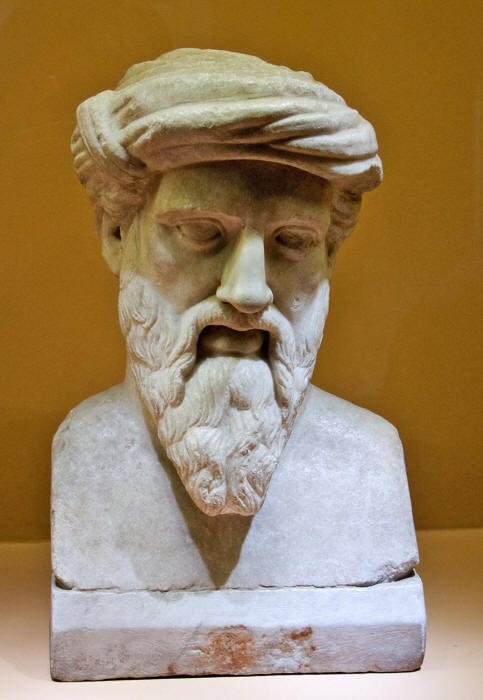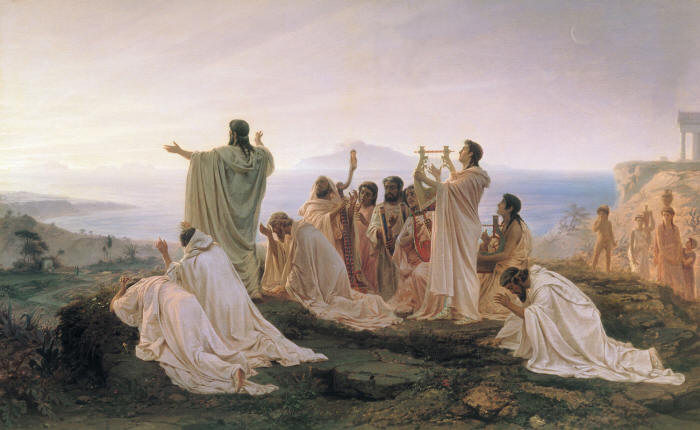|

by Van Bryan
September 19, 2025
from
ClasicalWisdom Website

Bust of
Pythagoras of Samos
Unknown author
Roman copy of a Greek original
from the
2nd-1st century BC
It's
really not what you thinků
Despite being something of a household name, the life
Pythagoras remains something of a mystery.
Yet his followers we can see more clearly:
the cult of Pythagoras was a truly unusual blend of
philosophy, religion, and mathematics.
Their beliefs included,
-
the transmigrations of souls
-
a strict commitment to vegetarianism
-
the supreme importance on numbers
Now,
the idea that the secrets of how the world and the
universe function could be understood by mathematics is
perhaps not so strange.
What makes the
Pythagoreans so striking is the mix of the rational
and the mystical, both the materialism and
the metaphysics of it all.
We have a tendency to think of ancient philosophy as
broadly falling into either the more scientific model of
Aristotle, or the more abstract world of Plato
and the forms.
Sean Kelly
Managing Editor
Classical Wisdom
Not much is really know about the Pythagoreans or their rather
mysterious founder,
Pythagoras.
Several different accounts of the Pythagoreans
have come down to us from antiquity. Plato and Aristotle
both reference the Pythagoreans throughout their philosophical
writings.
Even still, the true nature of the "cult of
Pythagoras" is often shrouded in mystery.
The questions abound:
Who were they?
Where did they come from?
What did they believe?
And most importantly, were they a cult?
That sort of question is not only interesting, it
is terribly complicated.
In the context of our modern world, we might
consider a group of individuals who worship mathematical harmonies
as not only being a cult, but also prime candidates for a
straitjacket.
However, in the context of ancient Greece it was not uncommon to
attribute great importance, even divine importance, to profound
philosophical formulations.
Thales of Miletus, for example,
attributed great importance to water:
he claimed that it was the foundation for all
of the universe.
Socrates, during the course of his
philosophical investigations, eventually came to believe that there
was a heavenly voice in his head (a
daimon) that compelled him to
pursue true knowledge no matter the cost.
These examples, however, do not grant the Pythagoreans a free pass.
While Socrates, Thales, and others did
attribute great importance to their discoveries, the
Pythagoreans outright worshipped their philosophical beliefs,
going so far as to sacrifice an ox after discovering the
47 Proposition of Euclid.
It was said that Pythagoras and his followers
settled in Crotona in South Italy around 530 BCE and went about
making a society for themselves that reflected their, let's just
call it, unique ideals for life.
A central tenet of the Pythagorean belief system was,
the transmigration of the soul.
This included the transmigration of human souls
into the bodies of animals.
It is perhaps for this reason that Pythagoras
strictly forbid the consumption of meat, resulting in his
followers becoming some of the earliest known vegetarians.
A strange side note of the Pythagorean diet is
that they were forbidden to eat beans.
The reason behind this is not entirely known.
A funny anecdote tells us that Pythagoras believed that a human
being lost a part of his or her soul whenever passing gas.
They wore a specific garb that was common only
amongst their followers.
Abstinence of the flesh was insisted upon.
However, this seems to have been a later
addition.
We do know that Pythagoras himself did not
die a virgin.
When it came to their philosophical beliefs, the
Pythagoreans were extremely superstitious and mystical.
They believed that the human soul was trapped in
a continuous cycle of death and reincarnation. It was taught
that the only way to free ourselves from this cycle was to obtain a
higher understanding of the universe through introspective thought
and philosophical study.

Pythagoreans
Celebrate the Sunrise
(1869) by Fyodor
Bronnikov
And so when examining the nature of the universe, a rather difficult
brand of philosophy known as metaphysics, the Pythagoreans
concluded the objects
within 'reality'
could be differentiated by the qualities that they have.
Certain things are different shapes,
colors, or sizes.
These qualities range dramatically and they are
by no means universal.
A leaf, for instance
The same can be said for smell, size, or
shape.
The Pythagoreans concluded that the one universal
quality of all things in
the Universe, the one thing that
everything had in common, was that it was numerable and could be
counted.
We could perhaps imagine a Universe without
smell or taste...
However, the idea of creating a hypothetical
universe without numbers is very much impossible.
And here we see the basis of the Pythagorean philosophy.
They believed that numbers were the
underlying substance of reality much in the way that Thales
believe water to be origin of being in the universe.
However, not all numbers were treated equally.
Some were considered more holy than others.
For instance,
the Pythagoreans attributed great importance
to the number one.
This is probably due to their ideas on the
formation of the universe.
It was proposed that there once existed chaos
and disorder within an unstructured, infinite universe.
Then, limitations were set upon the universe and
the world as we know it fell into order:
objects became numerable, the cosmos became
perceivable...
In this way the universe came from a sort of
chaos and took on a oneness that was
previously unknown.
This idea of a harmonious, single universe would
be echoed by the likes of Parmenides and Zeno of Elea.
|



